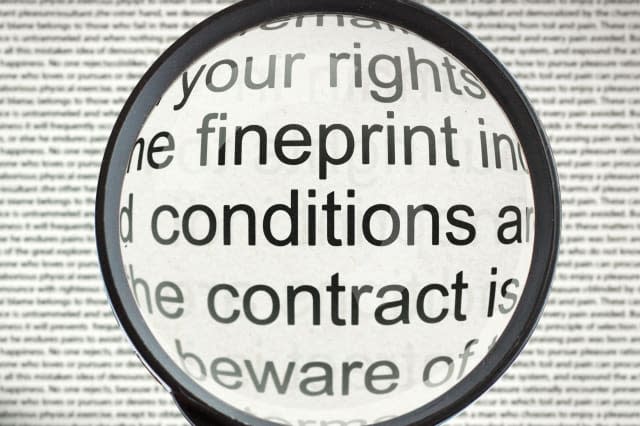77% of us don't read the small print - and it costs us dear

More than three quarters of Brits don't read the small print when we sign up for new services or buy complicated new products. And while we think we're getting away with it, there are some horrible consequences lying in wait for us all.
See also: Have you paid for your mobile phone twice?
See also: Why half of us pay for a gym membership and never go
See also: Budget to set out plans for clarifying small print and ending subscription traps
A study by Together Mutual Insurance found that 93% of us click that we've read the terms and conditions when our phone software updates - without ever bothering to check it. Likewise, 97% of us don't bother reading the small print when we buy tickets, and 95% don't worry about it when we sign up for subscription services like Amazon Prime.
It asked people whether they read some common contracts with plenty of small print, and the numbers who didn't bother were impressive
1 Purchasing cinema / concert / theatre tickets online (97%)
2 Food packaging ingredients and allergen guidance (95%)
3 Trialing an online service (e.g. Amazon Prime) (95%)
4 Updating smartphone software e.g. updating iPhone (93%)
5 Accepting new smartphone T&Cs (93%)
6 Online shopping checkout (91%)
7 Car finance contract (85%)
8 Household insurance policy (85%)
9 Life insurance policy (84%)
10 Updating online banking app (84%)
11 Loan contract (81%)
12 Tenancy agreement (67%)
13 Mortgage contract (61%)
14 New job contract (55%)
Jon Craven, CEO at Together Mutual Insurance, said: "Something so important to our everyday lives has become second nature to routinely ignore. Whether that's downloading new software or checking the terms of your home insurance, knowing more about what could affect you at a later date will help you to avoid difficult circumstances."
The researchers asked people why they didn't read them, and 65% said there's too much small print to bother with, 26% don't understand them, 25% said they trust the provider not to rip them off, and 10% don't think it matters.
The problem is that our decision to skip over the small print means we'll end up paying dear for our haste.
The consequences
The survey found that almost a third of people had paid a financial penalty when they tried to get out of a contract early - because they didn't realise there was a minimum period. These penalties can be outlandish.
Mortgage deals, for example, may be fixed for a period, and you could pay up to 5% of the outstanding loan if you want to leave early. It means that someone with a £200,000 mortgage could be faced with a £10,000 bill for trying to end the mortgage before the fixed term runs out.
Media deals can similarly be eye-watering. If you want to cancel Virgin Media, for example, before your minimum contract period ends, you'll pay £21.50 for super fibre, plus £10.80 for the phone - and that's for every month left to run on your contract. Assuming there was six months left, that would cost you the best part of £200.
It's no wonder that many people choose to stick with a product because it's not worth cancelling. In fact, the study fund that 40% of people were stuck in a contact for longer than they wanted to be.
It's not just minimum periods that can catch you out. Cancellations can be a thorny issue in themselves, because the Ts and Cs will include details of how much notice you need to give - and how you need to serve that notice. If you fail to follow the procedure, then the company may decide you have not cancelled at all - and start pursuing you for debts.
In fact, almost every aspect of any contract contains a potential pitfall that you need to get to grips with. Your home insurance, for example, may have rules about how long you go away from the house for; your tenancy agreement may have rules about attaching pictures to the walls; and your travel insurance may make it clear you are not covered if you consume alcohol on holiday.
Ts and Cs are never enormous fun to read, but surely it's better to put aside 10 minutes to read the small print than face penalties of hundreds or thousands of pounds when you accidentally break the rules.
But what do you think? Does this tempt you to read the small print? Let us know in the comments.








